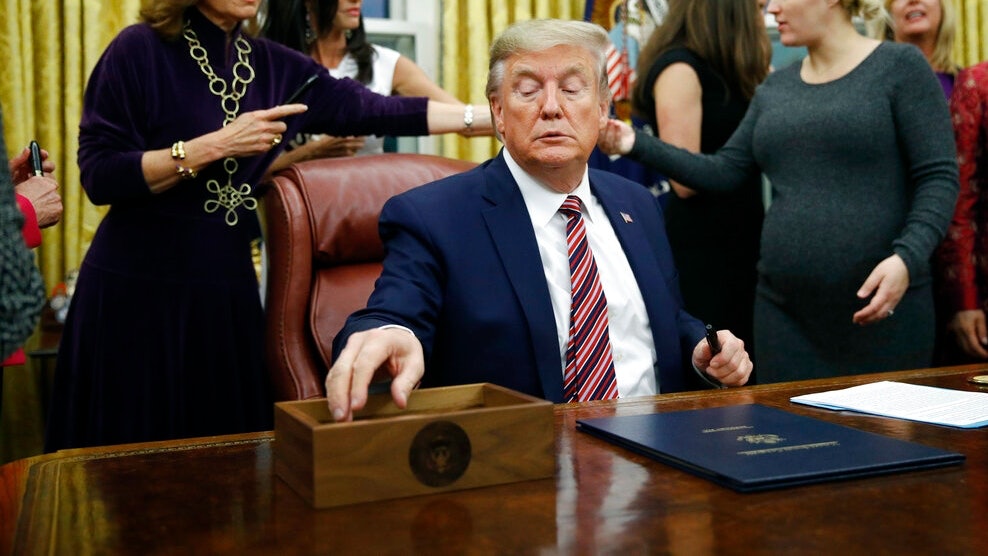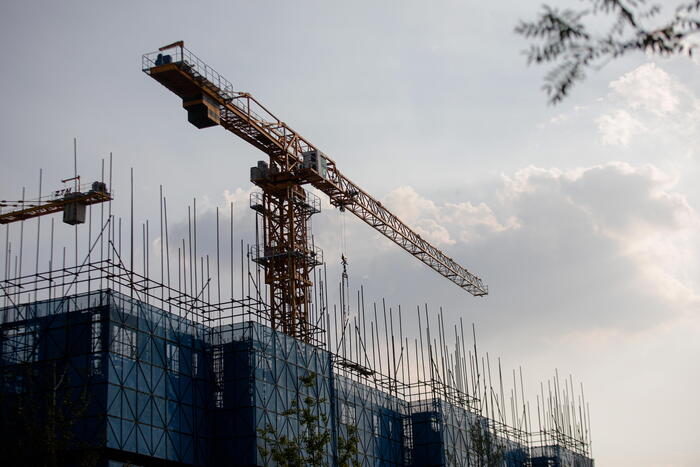Analyze comments
Written by: Xu Qiumeng
2019-11-26 17:02
Last updated: 2019-11-26 19:14More than five months of demonstrations in Hong Kong have not subsided, and the Hong Kong Human Rights and Democracy Bill recently passed by the United States Congress further complicates the situation, while US President Donald Trump in the Hong Kong Human Rights and Democracy Bill His statement and his changes on the Hong Kong issue are very intriguing. How does Trump view the Hong Kong issue? What does Hong Kong mean to him?
The Chinese government has reacted very fiercely to the "Hong Kong Bill of Rights and Democracy" and has slammed the bill. On November 26, Yang Jiechi, member of the Political Bureau of the CPC Central Committee and director of the Office of the Central Committee for Foreign Affairs, interviewed Xinhua News Agency reporters on the recent passage of the Hong Kong Bill of Rights and Democracy by the U.S. Congress. The Hong Kong-related bill, gross interference in China ’s internal affairs, and serious violations of international law and basic norms of international relations, China has resolutely opposed and strongly condemned this, and has already stated its solemn position to the US in this regard.
Earlier on November 20, Chinese Deputy Foreign Minister Ma Zhaoxu also summoned William Klein, the interim ambassador to the United States, for the bill. It is not enough to call a temporary agent. China ’s Deputy Foreign Minister also called on the US Ambassador to China Terry Edward Branstad on November 25 to put forward the Hong Kong Bill of Rights and Democracy passed by the U.S. House of Representatives and the House of Representatives. Negotiations and strong protests. On the same day, Geng Shuang, a spokesman for the Chinese Ministry of Foreign Affairs, emphasized again at a regular press conference, "Hong Kong is China's Hong Kong, and Hong Kong affairs are purely China's internal affairs ... the determination to oppose any external forces interfering in Hong Kong's internal affairs is unwavering.
China's fierce response contrasts sharply with Trump's subtle attitude. At present, the Hong Kong Bill of Rights and Democracy has passed the two sessions to the White House, waiting for Trump's signature. It is worth noting that Trump gave an ambiguous response on November 22 whether he would sign the Hong Kong Bill of Rights and Democracy.
On the same day, Trump was asked whether he would sign the "Hong Kong Bill of Rights and Democracy" during a live interview with Fox News. Instead, he said, "We want to walk with Hong Kong, but I also talk with Xi. The chairman goes. "
Trump ’s stance has triggered speculation, and the Washington Post analyzed that Trump ’s response showed that he might veto the Hong Kong Bill of Rights and Democracy. In fact, since the outbreak of demonstrations in Hong Kong (May), Trump's speech on the incident has repeatedly changed, divided into two phases.
The first stage was from May to early August. Trump's remarks on Hong Kong were very restrained, and he had never made any statements in support of Hong Kong protesters. According to the US media, that was because Trump had told Chinese President Xi Jinping during the Xi'an Xi Special Conference that he would refrain from speaking publicly on the Hong Kong issue as long as trade talks between Washington and Beijing continue to progress.
Earlier in June, when the Hong Kong protests had just begun, Trump said that it was "sad" to see such a large-scale protest. When asked about the Hong Kong protests in an interview on July 22, Trump said: "For Hong Kong protests, China could have stopped it if it wanted to stop it. Although I did not mention it myself, I think President Xi ’s approach is Still acted responsibly. "
For many Hong Kong demonstrators, using the United States to exert pressure on China in order to fight for "foreign aid" for the protest movement is an option that they have to do. (Reuters)
On August 1, when Trump was again asked about the Hong Kong incident by reporters, he still stated that "Hong Kong may be doing something, riots lasted for a long time ... but that was a matter between Hong Kong and China, because Hong Kong is part of China and they have to do it themselves. They don't need advice from others. "
From the above remarks, we can see that Trump did not want to make too many remarks on the incident, and repeatedly stressed that this is "China's own thing" and he will not interfere.
The second stage was in mid-August, when Trump's attitude towards Hong Kong changed, he frequently talked about the situation in Hong Kong and linked the issue to the trade war.
Beginning on August 14, Trump suddenly issued a series of tweets about the situation in Hong Kong. One of them asked Xi Jinping to resolve the Hong Kong issue "quickly and humanely." On August 15, he tweeted again, suggesting that Xi Jinping meet with Hong Kong protesters in person to resolve the Hong Kong problem and discuss the escalating crisis in Hong Kong. He also warned China that if a trade agreement is to be reached, it must be dealt with "humanely" Protests in Hong Kong. This is also the first time Trump has linked trade talks to Hong Kong in public.
Since then, Trump has frequently linked Hong Kong with trade talks in the open. On August 18, Trump said in Morristown, New Jersey, USA: "I hope they (Beijing) solve Hong Kong's problems in a very humane way, and I think it will be very helpful to the trade agreement."
On October 7, Trump again emphasized: "I hope the Hong Kong issue can be resolved humanely." He also warned that if Hong Kong had a "bad" ending, it would make it difficult for the United States and China to reach a trade agreement.
Trump says he has urged Xi Jinping to send troops to Hong Kong, Fudan scholar Shen Yi: poor political performance
Schiff previews Trump impeachment investigation report: no objection and conclusive evidence
Chinese business woman breaks Trump's Haihu manorhouse and sentenced to 8 months
After meeting with Chinese Deputy Prime Minister Liu He at the White House on October 11, Trump announced that the United States and China had basically reached the first phase of a trade agreement and answered reporters' questions about Hong Kong. "We discussed Hong Kong. I think China is in Hong Kong Great progress has been made. We discussed this issue. I think it will resolve itself. This (trade) agreement is a great deal for the people of Hong Kong and I think it is very positive for Hong Kong. "
From prudent speeches to linking the Hong Kong issue to the China-US trade agreement, Trump's changes not only reflect his erratic nature, but also reveal his "no value" on the Hong Kong issue.
Trump is a businessman president, which also means that he is not a traditional American politician and has no political ideology. For him, the relationship between the Hong Kong issue and the United States is not big, and it belongs to China's internal affairs. This is why when the demonstrations in Hong Kong just broke out, he was not as good as the speaker of the House of Representatives Nancy Pelosi and the US Secretary of State Pompey. Politicians, such as Mike Pompeo, generally make remarks about Hong Kong.
Without the ideology of the United States President, the biggest criterion for measuring the situation is his own political interests, which is also an important reason for Trump's remarks related to Hong Kong. At present, China and the United States are about to reach the first phase of a trade agreement, but in the process, the two sides have still differed and have been deadlocked on the issue of tariff elimination. Gary Cohn, former U.S. director of the National Economic Council and former chief economic adviser to Trump, has previously disclosed that the United States is "urgently" hoping to reach a trade agreement with China, because Trump needs a victory and brings the stock market he expects. rise. Trump also pointed out on November 9 that China-US negotiations are slower than he expected.
People familiar with US politics know that binding various issues to pressure opponents is an important way of Trump negotiations. Similar to the South China Sea and Taiwan issues, the Hong Kong issue is only a bargaining chip for Trump to pressure China in order to achieve his own political interests. . Although China will not discuss the Hong Kong issue with the United States and will not allow the two countries to tie trade talks to Hong Kong, this does not prevent Trump from repeatedly mentioning Hong Kong and trying to package it as an aid to his own achievements. This is why the Washington Post believes that Trump will give up the possibility of signing the Hong Kong Bill of Rights. After all, compared with the first-phase agreement between China and the United States, Hong Kong is insignificant to him.
Trump U.S. Congressional Analysis Review





/cloudfront-eu-central-1.images.arcpublishing.com/prisa/3I74UEXLYRBBRPGPSGWNN6WXH4.jpg)

